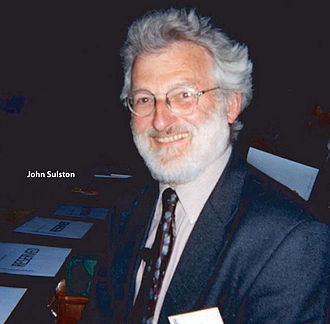 The distinguished biologist John Sulston died on March 6, 2018, at the age of 75, according to the Guardian (March 9, 2018). Sulston shared the 2002 Nobel Prize for Physiology or Medicine with Sydney Brenner and Robert Horvitz for their work on the nematode Caenorhabditis elegans. "By establishing and using the nematode ... as an experimental model system," the Nobel Assembly wrote, "possibilities were opened to follow cell division and differentiation from the fertilized egg to the adult. The Laureates have identified key genes regulating organ development and programmed cell death and have shown that corresponding genes exist in higher species, including man. The discoveries are important for medical research and have shed new light on the pathogenesis of many diseases."
The distinguished biologist John Sulston died on March 6, 2018, at the age of 75, according to the Guardian (March 9, 2018). Sulston shared the 2002 Nobel Prize for Physiology or Medicine with Sydney Brenner and Robert Horvitz for their work on the nematode Caenorhabditis elegans. "By establishing and using the nematode ... as an experimental model system," the Nobel Assembly wrote, "possibilities were opened to follow cell division and differentiation from the fertilized egg to the adult. The Laureates have identified key genes regulating organ development and programmed cell death and have shown that corresponding genes exist in higher species, including man. The discoveries are important for medical research and have shed new light on the pathogenesis of many diseases."
Sulston repeatedly took a strong and public stand against the attempts of creationists to undermine evolution education. In 2006, after a creationist organization sent unsolicited material promoting "intelligent design" to schools throughout the United Kingdom, he said in a public lecture (quoted in the Guardian, December 7, 2006), "[Pupils] are somehow being told these agendas are alternative ways of looking at things. They are not at all. ... One is science — a rational thought process which will carry us forward into the indefinite future. The other is a cop-out and they should not be juxtaposed in science lessons." He was also among the scores of Nobel laureates calling for a repeal of Louisiana's antievolution law (still on the books as Louisiana Revised Statutes 17.285.1) and the handful of Nobel laureates calling for the English ban on teaching creationism in the public schools to be extended to Scotland.
Sulston was born in Cambridge, England, on March 27, 1942. He received a B.A. in natural sciences (chemistry) from Cambridge University in 1963, where he also earned his Ph.D. in chemistry in 1966. After a postdoctoral stint at the Salk Institute, he returned to Cambridge University, where he played a central role in sequencing both the C. elegans and the human genome. In 1992, he was appointed as the director of the Sanger Center, leading the British contribution to the Human Genome Project; The Common Thread (2002), coauthored with Georgina Ferry, is his memoir about his involvement with the project. In addition to the Nobel prize, his honors included election to the Royal Society of London and the Darwin Medal from the Royal Society in 1996.
